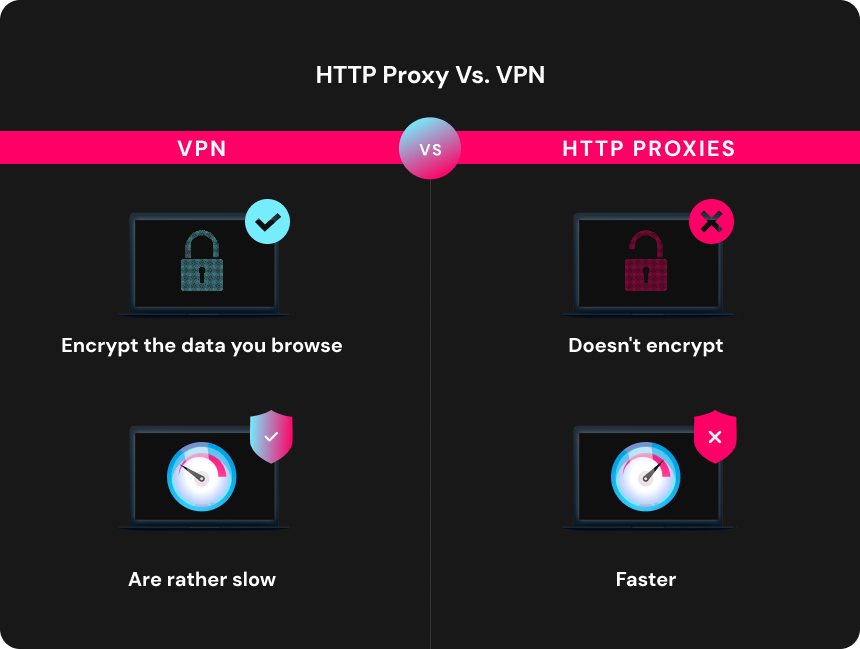When it comes to online privacy and security, many people turn to VPNs and proxies. But what exactly are these two services, and what sets them apart? Despite their common goal of providing anonymity online, they have distinct differences that users must understand to make an informed decision.
VPN and Proxy services offer online anonymity by disguising your Internet Protocol (IP) address via a remote server. However, their operations and the level of security they offer differ considerably. So, let’s take a closer look at them both and see their specific differences.
VPN explained
We’ve talked about Virtual Private Networks (VPNs) in other articles, but let’s dive into it once more here. A VPN is like a secret tunnel for your internet use. It hides your real internet address (IP address) by using the VPN’s address instead. Basically, it takes your internet traffic and sends it through a remote server, changing your real IP address to the VPN providers. This means it works across your whole device, protecting all your internet activities, whether you’re browsing the web or using apps, by making it all encrypted. This makes things much safer and private for you.
A VPN offers strong protection, keeping your online activities safe from internet companies, hackers, and even government eyes. It keeps you anonymous online, making it a solid choice for keeping your personal info and online habits private and secure.
Proxy server clarified
Acting as an intermediary between your device and the website you’re visiting, a proxy server hides your original IP address. When you use a proxy to visit websites, your internet traffic goes through a proxy server on its way to the website you’re visiting. This switch means the website sees the proxy’s IP address, not yours, which can help you stay more anonymous online. However, its operations are limited to a single app or service, and it doesn’t encrypt your traffic, thus offering lower security levels than a VPN.
But proxies are quite handy for getting around internet blocks, accessing content restricted in your region, and speeding up web surfing by storing copies of frequently visited web pages. This can make websites load faster since the proxy can deliver the stored page without having to go back to the website. They can be categorized into three main types:
HTTP Proxies: These are dedicated to web pages. When you configure your browser with an HTTP proxy server, all browser traffic is rerouted through it.
SOCKS Proxies: These proxies are not limited to web traffic. They work at the application level and can manage different traffic types, although they are usually slower than HTTP proxies.
Transparent Proxies: Users often need to be made aware of these proxies. They are set up by entities wanting to monitor users’ online activities or block access to specific websites.

Differences between VPNs and Proxies
While both VPNs and proxies can help you bypass geographic restrictions and access blocked content, the two have several key differences.
Encryption: VPNs encrypt your data, making it virtually impossible for anyone to intercept and decipher your online communications. Proxies, on the other hand, do not provide encryption, leaving your data vulnerable to interception.
IP address masking: Both VPNs and proxies mask your IP address, making it difficult for websites and other online entities to track your online activities. However, VPNs replace your IP address with the IP address of the VPN server, while proxies simply hide your IP address.
Anonymity: While both VPNs and proxies offer a certain level of anonymity, VPNs provide a higher level of anonymity compared to proxies. By replacing your IP address with the IP address of the VPN server, VPNs make it much harder for websites, advertisers, and other online entities to track your online activities.
Which one should you choose?
When deciding between a VPN and a proxy, it’s important to consider your specific needs and requirements. Here are some factors to consider when choosing between the two:
Privacy and security: If privacy and security are your top priorities, a VPN is the way to go. With their encryption capabilities and IP address masking, VPNs provide a higher level of privacy and security compared to proxies.
Bypassing restrictions: Both VPNs and proxies can help you bypass geographic restrictions and access blocked content. However, VPNs provide a more reliable and comprehensive solution for bypassing restrictions, as they encrypt your data and replace your IP address with the IP address of the VPN server.
Performance: Proxies can improve web browsing performance by caching frequently accessed web pages. If performance is a major concern for you, a proxy may be a better choice.
Customization: If you need more control over your online privacy and want to customize your browsing experience, a proxy may be a better option. Proxies can be configured per application, allowing you to choose which applications use the proxy and which ones don’t.
While both VPN and proxy reroute your traffic and hide your IP address, a VPN is superior due to its ability to encrypt your data. Therefore, if you’re looking for enhanced privacy and security online, a VPN is the way to go. However, a proxy may be a better choice if performance and customization are more important to you. Remember, online security starts with a click.



